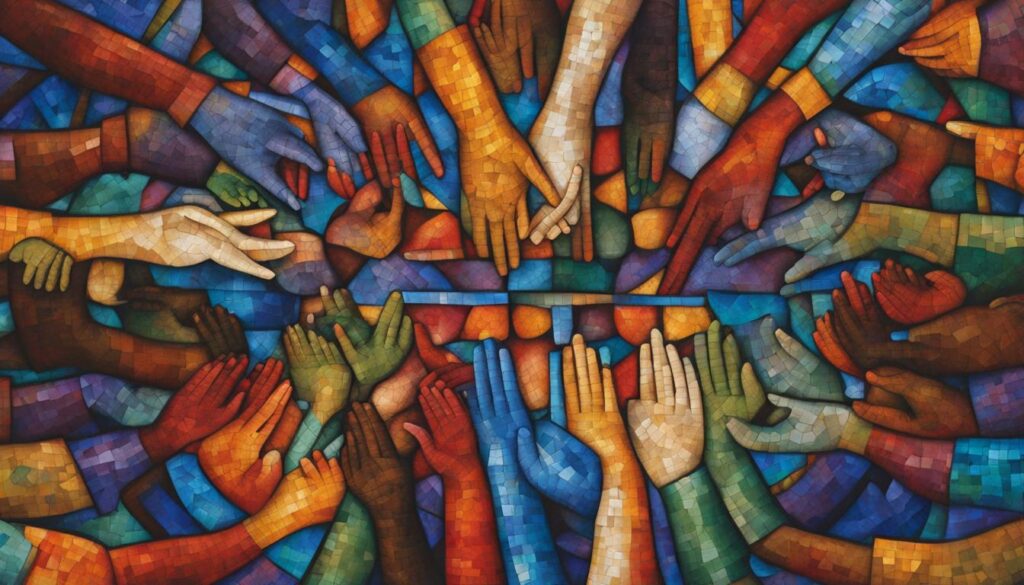Prayer has played a significant role throughout human history, with its origins dating back to ancient civilizations. It has been practiced in various forms and has held different meanings in different cultures. Prayer has been used as a way to communicate with higher powers, seek guidance, express gratitude, and find solace. Its historical significance can be seen in the rituals, traditions, and beliefs associated with prayer in different parts of the world.
Key Takeaways:
- Prayer has a rich and diverse history spanning across cultures.
- It has been practiced throughout human history, evolving to meet the needs and beliefs of different societies.
- Prayer serves as a means of communication with higher powers and a source of guidance, gratitude, and solace.
- The historical significance of prayer is evident in the rituals, traditions, and narratives passed down through generations.
- Understanding the prayer world history definition allows for a deeper appreciation of its role in shaping our collective human experience.
Evolution of Prayer Practices in Ancient Civilizations
In ancient civilizations such as Mesopotamia, Egypt, and Greece, prayer held immense importance as an integral part of religious and spiritual practices. The evolution of prayer throughout human history showcased its significance in connecting humans with the divine and communicating their needs and desires. While the rituals and ceremonies associated with prayer varied across different civilizations, the underlying belief in its power remained consistent.
In Mesopotamia, prayer was seen as a way to appease the gods and seek their favor. The ancient Mesopotamians believed that through prayer, they could invoke protection, offer gratitude, and seek guidance in decision-making. Similarly, in ancient Egypt, prayer was a means of communication with the gods and goddesses. The Egyptians believed that their prayers could influence the outcome of events and bring blessings.
Greek civilization also had a rich tradition of prayer. The ancient Greeks prayed to various gods and goddesses, each responsible for different aspects of life. Prayer was an essential part of religious ceremonies and festivals, and it played a vital role in seeking divine intervention and guidance. The Greeks believed that their devotion and prayers could lead to favorable outcomes in their lives.
Through the evolution of prayer practices in ancient civilizations, it is evident that prayer played a central role in human life. It served as a means of communication with higher powers, a way to seek guidance and protection, and a source of comfort and solace. The importance of prayer in ancient civilizations laid the foundation for its continued significance in subsequent cultures and religions throughout history.
Cultural Perspectives on Prayer in Ancient Civilizations
| Civilization | Prayer Practices | Beliefs |
|---|---|---|
| Mesopotamia | Offering prayers, reciting hymns, performing rituals | Prayers as a means to appease gods and seek their favor |
| Egypt | Offering prayers, presenting offerings, reciting spells | Belief in the power of prayers to influence events and seek blessings |
| Greece | Offering prayers, performing sacrifices, participating in rituals | Prayers as a way to seek divine intervention and guidance |
“Prayer played a central role in ancient civilizations, connecting humans with the divine and serving as a means of seeking divine favor and guidance.”
The evolution of prayer practices in ancient civilizations underscores the enduring significance of prayer in human history. It laid the foundation for the diverse prayer practices and beliefs that emerged in different cultures and religions worldwide.
Prayer in World Religions: A Panorama of Cultural Perspectives
Prayer is a universal practice that holds deep cultural significance in various world religions. Each religion has its own unique perspectives on prayer, shaped by historical contexts and cultural beliefs. Understanding the significance of prayer in global history allows us to appreciate the diverse ways in which people seek spiritual connection and guidance.
Christianity
In Christianity, prayer is a central element of the faith, serving as a means of communication with God. It is believed to deepen the relationship between individuals and the divine. Jesus Christ, considered the model of prayer, provided guidance on how to communicate with God. Christians offer prayers for guidance, forgiveness, gratitude, and interceding for others.
Islam
In Islam, prayer holds great importance and is one of the Five Pillars of the faith. Muslims are required to perform ritual prayers five times a day. These prayers, known as Salah, involve specific movements and recitations in Arabic. Muslims view prayer as a direct connection with Allah, seeking spiritual purification and guidance.
Hinduism
Hinduism emphasizes prayer as a means of spiritual growth and connection with the divine. Prayers, known as Bhakti, are offered to various deities and can take various forms, including reciting mantras, singing hymns, and performing rituals. Hindu prayers seek blessings, divine intervention, and spiritual transformation.
Buddhism
In Buddhism, prayer is seen as a way to cultivate mindfulness, compassion, and inner peace. Buddhists engage in meditative prayer to develop a deep understanding of reality and alleviate suffering. Prayer is often accompanied by the recitation of sacred texts, such as sutras, and the use of prayer beads.
Judaism
In Judaism, prayer plays a central role in worship and daily life. Jews offer prayers to express gratitude, seek forgiveness, and connect with God. The Siddur, a prayer book, contains a rich collection of prayers for various occasions. Prayers are often recited in Hebrew and may include songs and liturgical chants.
These examples provide a glimpse into the diverse cultural perspectives on prayer within different world religions. Prayer serves as a bridge between individuals and the divine, offering solace, guidance, and spiritual growth. By appreciating the historical context and significance of prayer in global history, we gain a deeper understanding of the richness and diversity of human spirituality.

The Power of Prayer in Shaping Historical Events
Throughout history, prayer has played a pivotal role in shaping the course of events and influencing the lives of individuals and communities. It has served as a powerful catalyst for change, providing solace, inspiration, and healing in times of adversity. The historical significance of prayer can be seen in the records of major historical events and the personal narratives of those who have experienced its transformative power.
From ancient leaders seeking divine intervention in battles to religious figures advocating for social justice, prayer has been a driving force behind significant historical moments. It has been a source of strength and hope, inspiring acts of compassion and forgiveness, and instilling a sense of unity and purpose. The impact of prayer on historical events is evident in the stories of individuals who have turned to prayer in times of crisis and witnessed its miraculous influence.
One notable example of the power of prayer in shaping history is the civil rights movement in the United States. Figures like Martin Luther King Jr. drew upon their faith and led nonviolent protests, guided by the belief in the power of prayer to bring about social change. Prayer served as a foundation for their activism, providing strength, courage, and resilience in the face of adversity. Their prayers and unwavering commitment to justice and equality helped dismantle systemic racism and paved the way for significant advancements in civil rights.
Another illustration of the historical significance of prayer is found in the testimonies of individuals who have experienced personal transformations through prayer. Countless stories of individuals overcoming addiction, finding inner peace, and discovering their purpose in life highlight the profound impact prayer can have on an individual’s spiritual and emotional well-being. Prayer has the ability to bring about profound changes in one’s life, fostering personal growth, and deepening one’s connection with the divine.
| Historical Event | Impact of Prayer |
|---|---|
| Civil Rights Movement in the United States | Prayer served as a guiding force for leaders and activists, providing strength and inspiration to fight against racial injustice. |
| Personal Transformations | Prayer has helped individuals overcome challenges, find peace, and discover their purpose, leading to positive life changes. |
| Battles and Wars | Throughout history, leaders have turned to prayer to seek divine intervention and guidance in times of conflict, with prayer playing a role in military strategies and decision-making. |
These examples highlight the profound influence of prayer in world history and its ability to shape events on a personal and societal level. The historical significance of prayer resonates across cultures and time periods, underscoring its universal impact on human spirituality and collective experiences.
Prayer as a Source of Personal and Spiritual Growth
Prayer has long been recognized as a powerful practice that transcends cultural boundaries and connects individuals to something greater than themselves. It is a practice deeply rooted in the histories of diverse cultures and is seen as a means of personal and spiritual growth. Throughout the world, prayer has been a source of solace, guidance, and inner peace for people from various backgrounds and belief systems.
The origins of prayer can be traced back to different cultures, each with its unique perspective on its purpose and significance. In ancient civilizations such as Egypt, prayer was often offered to the gods as a way to seek favor and guidance. In contrast, indigenous cultures viewed prayer as a way to connect with nature and find harmony with the world around them. These cultural perspectives on prayer highlight the universal human desire for connection, understanding, and growth.
“Prayer is not asking. It is a longing of the soul. It is daily admission of one’s weakness. It is better in prayer to have a heart without words than words without a heart.” – Mahatma Gandhi
Prayer is a deeply personal experience that allows individuals to reflect, seek clarity, and find strength. It can provide a sense of purpose and direction, helping individuals navigate the challenges of life with a renewed sense of faith and hope. Through prayer, individuals can cultivate a deeper understanding of themselves, their purpose, and their connection to the divine. It is a practice that transcends time and cultural boundaries, offering solace and spiritual growth to those who embrace it.
| Culture | Prayer Perspective |
|---|---|
| Egyptian | Prayer as a way to seek favor and guidance from the gods |
| Indigenous | Prayer as a means of connecting with nature and finding harmony |
| Christianity | Prayer as a way to deepen the relationship with God and find spiritual growth |
| Islam | Prayer as one of the Five Pillars and a means of connecting with Allah |
| Buddhism | Prayer as a way to cultivate mindfulness and compassion |
Whatever the cultural perspective or religious belief, prayer remains a universal practice that has the power to transform and uplift individuals. It provides a spiritual anchor in times of uncertainty, a source of hope in dark moments, and a pathway to personal growth and enlightenment. Regardless of the specific tradition or ritual, prayer is a timeless and profound practice that continues to play a vital role in the lives of people across the globe.
Conclusion
Prayer has a rich and diverse history that spans across cultures and religions. It has been practiced throughout human history, evolving and adapting to the needs and beliefs of different societies. From ancient civilizations to modern times, prayer has remained a fundamental aspect of human spirituality and a way to connect with the divine.
By understanding the prayer world history definition, we gain a deeper appreciation for the role prayer has played in shaping our collective human experience. Prayer has been a source of strength, solace, and guidance for individuals and communities throughout time. It has provided comfort in times of crisis, inspired acts of compassion and forgiveness, and brought about personal and spiritual growth.
From the ancient rituals of Mesopotamia to the prayer practices of world religions such as Christianity, Islam, Hinduism, and Buddhism, prayer has held significant meaning and significance. It reflects the historical and cultural context in which it developed and continues to evolve. Its influence can be seen in the records of major historical events and the personal narratives of those who have experienced its power firsthand.
As we look back at the prayer world history definition, we recognize the profound impact that prayer has had on global history. It has shaped the lives of individuals, influenced the course of events, and provided a means of connection and spiritual growth. Prayer is a timeless and universal practice that continues to be cherished and valued in our modern world.
FAQ
What is the historical significance of prayer?
Prayer has played a significant role throughout human history, shaping events, providing solace, and influencing individuals and communities.
How does prayer vary across different cultures and religions?
Prayer practices, rituals, and beliefs vary across different cultures and religions, reflecting their unique historical and cultural contexts.
What is the purpose of prayer in different religions?
In different religions, prayer serves various purposes such as communication with the divine, seeking guidance, expressing gratitude, and finding spiritual growth.
How has prayer evolved throughout history?
Prayer has evolved and adapted to the needs and beliefs of different societies, while maintaining its fundamental role in human spirituality.
What is the personal and spiritual significance of prayer?
Prayer has the power to transform individuals, providing a sense of purpose, peace, and connection to something greater than themselves.
How can prayer be a universal and timeless practice?
People from various cultures and religions have found solace and spiritual growth through prayer, making it a universal and timeless practice.








